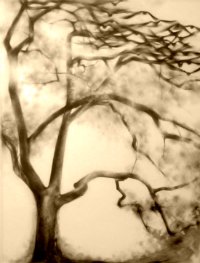Loss Of A Spouse
Grief Retreats For Widows
Led By Jon Terrell, M.A.
If you have recently experienced the loss of a spouse, you know how devastating, confusing, and scary it is. You are in deep grief, and although support from others is appreciated, it hardly touches the pain of grief. We offer grief retreats for widows and others who are in emotional pain.
No one experiences grief in quite the same way.

For the past 25 years, I have been leading grief and loss 3-5 day retreats focusing on helping people heal from significant losses. People often attend because of the loss of a spouse.
We create a temporary but powerful healing community designed to deeply witness, love, and honor each participant's experience of loss.
The loving power of a community can hold emotional pain in a way that individuals cannot.
At the retreats, rather than try to change your experience, we focus on creating a space of deep love. A place where you are accepted as you are and can experience all of what you are going through without interference and with the healing embrace of love.
We create a safe, healing space at our grief retreats for widows and others, where people in deep pain can be seen and heard in love, where your thoughts and feelings are honored and accepted.
Friends and family most often have limited capacity for our pain and quickly move into trying to manage, suppress, and avoid it.
You may have already experienced this with the loss of your spouse. Instead of being there for you, you may be getting a lot of good-intentioned advice and suggestions for you to avoid your pain, distract you from your pain, or tell you how to think and behave.
Yet, at these times, what you may really want is just to be with your pain or to get help sorting through your difficult feelings.
People try to distract you. To get you to move on. To get you to stop crying! To go to the next stage, whatever that is, as long as you stop being so broken.
However, your family and friends' good intentions may actually be more about their fears and suppressed grief than yours.
People have all sorts of beliefs about grief: what it should look like, how long it should last, how much crying is okay, etc. What is enough time?
And these beliefs are often formed in our childhood years.
Avoiding The Experience of Spouse Loss
And we may try to distract ourselves from the experience of loss.
It can feel too big, too harsh, too painful to bear. And it often is, which is a reason people give for attending our retreats.
At the retreats, I often suggest "sipping it" by which I mean leaning into our grief in small doses, coming back to the present for a moment, and then going in for another plunge.
A skillful group can hold for us the unbearable, in loving trust as we learn to navigate our new world of deep pain. At our grief retreats for widows and others, we create a safe and warm environment from the start.
When we are experiencing the loss of a spouse and other deep losses, we can be so overwhelmed with feelings that we get stuck. And it overwhelms family and friends who are trying to support us.
Other people don't know what to do with your grief and loss and don't want to have their own suppressed grief, their own tears from the past surface. So, despite wanting to help, they have little tolerance for your emotional pain.
They can't handle the rollercoaster of grief, with all its sadness, guilt, fear, and other feelings. Not only does it feel like too much to handle, but their own grief can get triggered. They may feel the need to avoid you to avoid their own feelings from the past.
Finding someone who can be with you in your pain without trying to distract you is a rare gift.
At the retreats, we create a temporary community that can be there for you. The power of a loving community teaches us how to be there for others, and helps us let go into the loving arms and hearts of fellow human beings.
This is an even greater gift.
We arrive in deep emotional pain because of the loss of our spouse, and meet a community of others in distress. Together, we build a healing place of acceptance and love that embraces our and each other's pain.
Participants leave our grief retreat for widows with much more space within themselves, open yet filled with loving connection. They aren't done with their grief journey, but have a much deeper capacity to trust their own process and that of others.
That may be the most profound gift of all.

What To Expect At Our Grief and Loss Retreat
Our retreats are designed to help a small group of people, usually 8-12 participants, learn to trust life, even in the midst of heartbreaking pain. And in that trusting emotional openness, our woundedness is honored, accepted, held, and embraced. In this process, it begins to change and evolve.
Often other feelings emerge that have been hidden below our grief. This can surprise us or be close enough to the surface of our awareness that other feelings are already seeping through.
Elizabeth Kubler-Ross said, "Grief never dances alone," meaning that these other feelings...anger, resentment, loneliness, anxiety, fear, etc. are all part of our grief journey.
We may be holding strong judgements towards others as well.
We may be angry with them. Or with ourselves.
Each of us travels on this journey in their own unique way, and our retreats are not "one size fits all" but are designed to allow you to find your own path towards healing.
What the power of a loving community can do, is hold for you that which may be unbearable right now, so that you can digest what you are ready for.
For me, when I was stuck in deep pain, the experience of a loving community, trained is the skills of loving, was miraculous. A lifetime of suppressed grief came to the surface and I was able to grieve.
But first I had to face other feelings I had buried along with the grief...and tap into a power inside of me to remove the weight of all the grief.
In my experience over these past decades, with hundreds of participants, this is something that just doesn't happen in individual therapy, support groups and mental focused retreats. Healing grief is not a mental process, something we can just figure out. The grief of a loss of a spouse and other losses, live inside of us, in our hearts, digestive tract, as well as all over as a heavy weight.
Our work is to excavate those feelings, that live below the surface of our ordinary awareness. Where do they live? The live buried in our bodies. As they surface we can learn to accept them into the light of loving awareness to heal and grow.
Go From Loss of a Spouse To Our Grief and Loss and Difficult Feelings Retreat Page
Go To Healing Stuck Feelings Page
Go To Helping People With Grief Page

